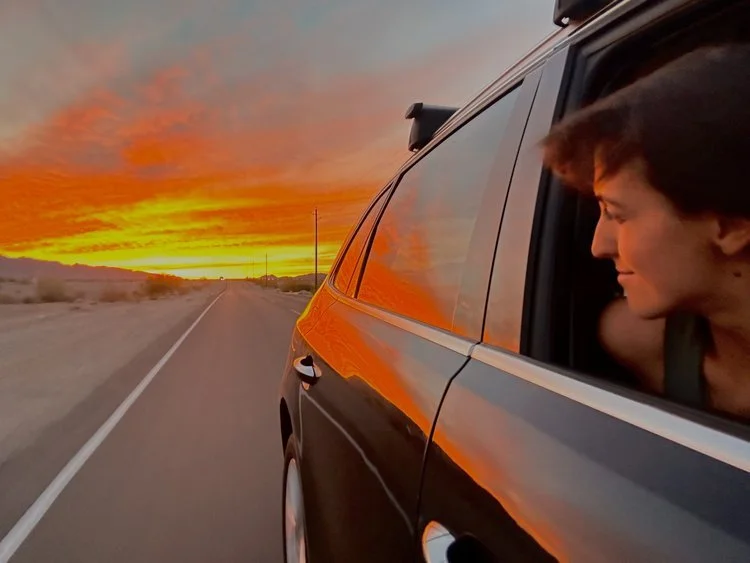A Strange Nostalgia
“If you don’t become the ocean, you’ll be seasick every day.”
The last time I wrote a newsletter, it was July. It was called “Year of the Mountain” about my close friend’s suicide, the sanctuary of time with a toddler, Europe’s highest peaks, and the courage to fall in love again.
The newsletter before that, “A State of Grace”, was about a deeply rejuvenating solo-trip to the woods of Northern Wisconsin last March, writing the second draft of my novel, and moving through heartbreak.
In the beginning these newsletters were succinct and sanitized updates on professional whereabouts, successes, set backs, and stories I wanted to share in a more intentional capacity. Since, they’ve evolved into unvarnished check points of significant moments in life, and with that, the added expectation to write only when I have something truly meaningful to say.
In revisiting the past nine months, I am surprised by the strange nostalgia I feel for a year with no respite — the way a sailor might be nostalgic for the squalls at sea, or a child for the cast around a broken bone.
I’ll spare you any “what didn’t kill me made me stronger” clichés because it’s actually not true. It’s not strength I gained, but rather, fierce protection over my own vulnerability. In the absence of strength, my circle shrank. I lost not just interest but actual capacity for small talk and actively avoid any interactions that feel like diving into the shallow end of the pool. I learned that the cost of any kind of emotional poverty was abandoning the deepest parts of myself, and that something, somewhere, is always keeping score.
After months of not writing anything but work emails, I am pleasantly surprised to remember that writing is simply the act of sitting down and telling the truth. Below is a retrospective journey that blends the personal and professional as each keeps imitating the other, and to honor that it is to lay it bare.
The end of summer flew like a freight train with the passing of my paternal grandmother, my 27th birthday, and a sudden ambush of work opportunities I couldn’t afford to turn down. In the span of literally days, I went from working as a 1st AD on commercials (which was alright), to a Post-Supervisor on a multi-million dollar campaign (which I loved), only to be offered a steady, corporate, full-time job (which I quit after 4.5 days due to a comically misleading description… let’s just say the last time I painted rocks for “lunchtime activity” was closer to the 1st grade).
Before I could process this whirlwind, ROW OF LIFE secured an angel investor, who financed the remainder of post-production in time for a potential Sundance premiere. That same week, the true crime docu-series set in my hometown that I’d spent two years quietly developing, earned an A-List celebrity Executive Producer, and co-production partnership with one of the biggest studios in Hollywood (a conversation pinned for another time!).
It seemed clear that I was being redirected to keep my head down and focus unequivocally on my two biggest projects (albeit unpaid) until the end of the year. It also reinforced a belief I’ve held for some time that life is an accumulation of people believing in you. Their validation puts just enough gas in the tank to help you get to the next station, but it’s you in the driver’s seat, determining the destination. For four months, I planned to stay in the fast-lane with eyes locked on a certain kind of finish line.
Before I knew it, the loose grip I held on long days fell like sand through open fingers, landed as dust on the ground, and was swept away.
Days were getting shorter and so was the countdown. Timelines were chopped and cuts were exported, uploaded, and QC’d. Notes were given, compiled, debated, rejected, ingested, and then reviewed again. We hosted private screenings and paid top editors and directors to give us deep-dive analyses of the story’s structure. Time again, I was shocked by the on-going malleability of the film, its contents stretched and contracted so many hundreds of times, and still, more to explore. I asked one prominent editor, Joe Beshenkovsky, how he knew a film was done, and his advice looped endlessly in my mind: “Deadlines, mostly,” he said, “or running out of money… but really, the film tells you when it’s done. When it just doesn’t give any more, that’s when you know.”
The cycle repeated for weeks, with each updated cut uploaded in our festival submission portals and flagged for programmers. As we progressed through each round of elimination, my hope grew. As the Vimeo views ticked upward, my confidence soared. Much hinged on the validation and endorsement this acceptance would offer. Daily, I visualized answering a call from a Park City area code.
In the final week of decisions, ROW OF LIFE was rejected.
It’s a moment I will remember for the rest of my life.
My producers agreed that it was probably for the best as the film could benefit from another 4-6 months of post, which for me, meant another 4-6 months of scrapping by financially in order to maintain full-time creative commitment to a five year project I had all but lost regenerative capacity for. My tank was well past empty, and there were no new believers to help re-fuel.
While I held it together for a while, I sunk into a silent depression that eventually ballooned into four months of chronic insomnia.
Not only that, but I was wholeheartedly out of ideas. I couldn’t watch the film alone without immediately turning it off. It was utterly flavorless. A meal I had eaten far too many times and physically could not stomach anymore.
We decided to hire outside help, and in January I flew to New York City to hunker down with a brilliant editor, L. Frances Henderson, to “break the film” and start again. At first, the changes were so sweeping it caused a mountain of anxiety. I just wanted to put things back where they were so the film would play smoothly again, but Frances guided me on how to dig deep in searching for the story’s true emotional core, and re-think what footage and sound bites would provide a clearer understanding of that core message from beginning to end. I spent another week implemented these changes with my lead editor, Joseph DeRose, in San Francisco, and felt, once again, things were back on track.
Nevertheless, my insomnia persisted.
Brain fog, short-term memory loss, severe migraines, loss of temper, loss of appetite, and nightly panic attacks ate away at my psyche. Nightly, I wouldn’t fall asleep until 5-6am, after succumbing to sheer exhaustion or usually a good cry, and would have to force myself awake by 9am to repeat the same commitments as before.
I tried everything, from talk therapy to THC/CBD, to all sorts of sleeping pills (you name it), to various levels of exercise, to über strict bedtime routines, to all the sleep hygiene tips imaginable, to 21 blood tests for 49 biomarkers only to have no clear culprit to blame and no clear solution emerge.
It felt like every night, for four months, something I had a right to was stolen from me. I figured eventually my immune system would collapse and force my body to shut down the same way something was prying it to stay awake, but it never did.
In those long nights, I realized I never got to ask my grandma what it was like to grow up in Kentucky or what parts of me I can point to as Polish. I thought about the genocide in Palestine, images of one of the greatest atrocities of our time replaying in my head, and an on-going bafflement at the level of cognitive dissonance and compartmentalization our humanity (myself included) is capable of in order to justify going on with our lives. I kept picturing the rings on trees, and how dendrochronologists can trace years of drought or flood or fire it endured. I wondered if after I’m gone and my organs are donated to science, if future doctors or ChatGPT will pop the hood to my brain, and like trees, see how these sleepless nights scarred the tissue.
My grandmother, top right, and the Peleskes.
NYC vs LA edit bay timeline — three months apart.
Regardless of immense progress, the cut still wasn’t there yet, and the search for a new finishing editor began again. I spent another week with editor Sara Newens in Los Angeles, which I equate to the difference of trying to assemble IKEA furniture on your own, or hiring a carpenter with 30+ years experience to build it for you. Though her new edits were largely subtle, the difference was astounding. Like curves of a custom table, the cuts were butter smooth, each adding a fresh layer of clarity and immersion that undeniably improved the film. At a certain point, nothing could be moved in the timeline without causing the rest to go haywire. It wouldn’t give anymore — just like Joe said. At last, the film was chiseled to its bones, its final structure revealed: a hero’s journey, a contemporary yet timeless love story on the meaning of true sacrifice.
A week later, I had two hypnotherapy sessions whereupon I finally felt my body release. The hypnotherapy is difficult to describe, and even more so if I try to massage my verbiage for skeptics as opposed to mystics, so I’ll save myself the mental gymnastics, and just say that when nothing else worked to retrain my brain how to fall back asleep, this was a turning point.
I had a very beautiful vision during hypnosis of my heart as a shining red ruby, pounding as a steady drum in perfect rhythm in my chest. I left that experience learning that my heart is the strongest part of my body — an engine that keeps going even when the rest is running on fumes. It gave me awareness of how steadfast the things we do not see are holding together, even if my surface-level perception is that they’re falling apart. And for that, I say thank you.
Today, I am happy to share that ROW OF LIFE is now picture-locked. It has begun its next phase of pre-sale and distribution, and only time will tell what comes of that. On a personal note, I am exceptionally proud of the quality of film it is; it exceeds my expectations in every way, and, most importantly, fulfills a profound promise I made over five years ago to my friend, Angela Madsen, to finish what we started.
Now I hope we both can rest.





